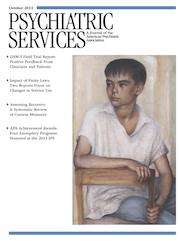Impact of State Mental Health Parity Laws on Access to Autism Services
Abstract
Objectives
This study examined the effect of state mental health parity laws on family financial burden, satisfaction with health insurance, and receipt of needed mental health services for privately insured children ages three to 17 with autism spectrum disorder (ASD).
Methods
Data came from the 2005–2006 wave of the National Survey of Children With Special Health Care Needs. An econometric approach with instrumental variables was used to control for the nonrandom selection of states according to their mental health parity laws. The study analyzed data for 949 youths with ASD and private health insurance. Six outcome variables were examined, including several measures of family financial burden, satisfaction with health insurance, and receipt of needed mental health services.
Results
Families of children needing mental health services and living in a state with a strict parity law had a 61% higher probability of reporting out-of-pocket spending >$1,000 compared with those not living in a strict parity state. Compared with families of children living in a strict parity state that did not specify ASD, those living in a strict parity state that specified ASD had a 92% higher probability of reporting unreasonable out-of-pocket spending. All other results were statistically insignificant.
Conclusions
In contrast with previous research, this study did not find strong evidence that state mental health parity laws positively affected service access for children with ASD. Future research on the effect of autism insurance reform will provide a more precise test of the impact of insurance mandates on improving access to treatment services for children with ASD.



